Last year (around this same time, in fact), we football video game fans were given the bombshell news that EA's exclusive contract with the NFL wasn't quite as exclusive as we thought. That contract apparently only covered "simulation" football games (which makes me wonder how or why EA has the license to begin with, since they sure as heck haven't been making a simulation football game since at least 2011). Other companies were apparently free to purchase an NFL license for "non-simulation" football games, and last year 2K announced that they would, in fact, begin production on one (or more) NFL-licensed arcade games. It wasn't the triumphant return of ESPN NFL 2k that we had been waiting 17 years for, but we'll take it!
EA is [finally] returning to college football games!
Well yesterday, we got another bombshell announcement. EA will be producing a college football video game. Currently, EA does not have the NCAA license or the rights to player likenesses, so the game is to be titled "EA Sports College Football", instead of continuing with the NCAA Football moniker of past. However, EA does have the rights to "over one hundred" schools. There's 130 teams in the Division I Football Bowl Subdivision, so a team count of over 100 implies that most, if not all, D-I FBS schools will be present, with their respective logos, uniforms, stadiums, and so forth. My understanding is that EA also does not have the rights to the conference names, so in addition to making up randomized rosters, they will also have to make fake conferences for the schools. I haven't seen anything yet that clarifies whether EA will have rights to bowl games or the College Football Playoffs and Championship. But this game is still 2 or 3 years out from releasing, so a lot can change in the meantime!
EA could bypass the NCAA and secure the rights to player likenesses, but they've opted not to do so. It's a shame, but I do understand that without a single players' union (like the NFL Player's Association for the pros), securing the rights to hundreds or thousands of player names and likenesses individually would be a huge logistical and legal nightmare. I would also have to assume that if EA is not pursuing player likeness rights, then they probably won't include the easy roster customization and sharing features of NCAA 13 and 14, as that would likely land them in the same exact legal troubles that caused the series to get canceled in the first place. I would prefer if EA could use player likenesses and pay the athletes royalties from game sales, especially since that would stick it to the NCAA, which for so long denied college athletes the ability to get paid while simultaneously cashing in on those same athlete's names and performances. Since it didn't license its brand, the NCAA will not be getting any money from this game (as of the time of this writing).
Team and player customization is what caused the cancelation of NCAA Football to begin with,
so I doubt that such features would return in EA Sports College Football.
EA Sports College Football will not be releasing in 2021. A 2022 release is possible, but unlikely. So we'll probably have to wait until the fall of 2023 to see what EA will be offering up for this game, and if it will live up to the standard set by NCAA Football 13 and NCAA Football 14. The fact that the game will not have the NCAA license, conferences, or team names will likely put the new game at an immediate disadvantage, since it won't have those real-world images and names to lean on. [More]
af9450ff-a481-4ac6-8aa3-659b263b9f5e|0|.0
Tags:EA Sports College Football, football, college football, NCAA, NCAA Football, Electronic Arts, EA Sports, women, gender, gender equality, Sarah Fuller, micro-transaction, loot box, ultimate team, Star Wars: Squadrons
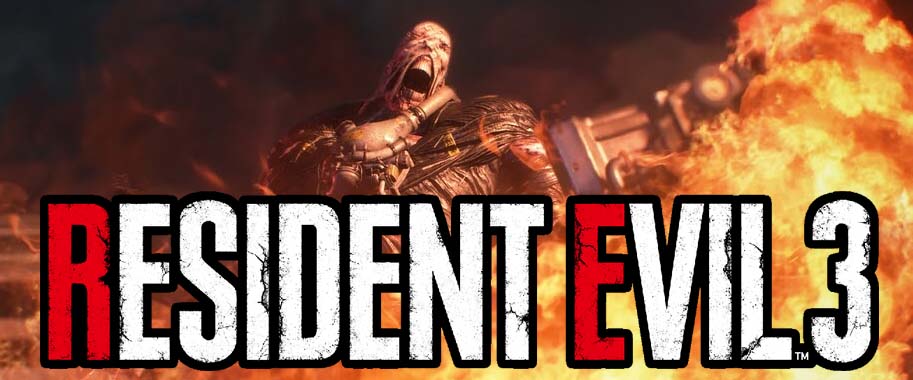
I played the demo of Nemesis that came packaged
with Dino Crisis, but never played the full game.
Right off the bat, I have to say that Resident Evil 3: Nemesis was never my favorite Resident Evil game. In fact, I never even played the whole thing. I played the demo that was included with Dino Crisis (back in the day when game publishers released playable demos before a game even came out). The original Nemesis erred more on the side of fast-paced action, which just doesn't appeal to me as much as the slower, more thoughtful design philosophy of the original Resident Evil, along with Silent Hill and Dino Crisis. This is why I love the original RE and its GameCube remake, why Resident Evil 4 rubbed me the wrong way, and why I never really got into the rest of the Resident Evil franchise beyond the first game. I tried playing all of the Resident Evil games up through 5, but the only one that came close to holding a candle to the masterful original was 2.
So even though I was excited to play Capcom's remake of the PS1 classic, I went in with tempered expectations. If they stayed true to the original, then RE3make (or whatever we're calling it) would be far more high-octane and action-heavy than the Resident Evil 2 remake that was released a mere year ago. As such, I expected that I just wouldn't be quite as into RE3make as I was into Resident Evil 7 or RE2make. I could only hope that it hit some happy medium between RE2make and Resident Evil 4. But that's really just personal preference on my part. Your tastes may vary.
So now that you hopefully understand where I'm coming from, what do I actually think of Resident Evil 3: Nemesis in 2020? Did Capcom learn any lessons from the few mistakes that were made with RE2make?
Resident Evil 3 is more reliant on spectacle action set pieces than on slowly building atmospheric tension.
The different nature of "Hardcore" mode
If you remember my review of Resident Evil 2 remake (and my lengthy YouTube critique), then you know that one of my core issues with that game was the fact that Capcom locked the Ink Ribbon save system behind that game's hard difficulty. Resident Evil 7 actually had the same problem, but it didn't bother me in that game because RE7 wasn't a remake of a game that included Ink Ribbon saves as a core component of its design.
I felt the Hardcore mode and breakable knife were huge design flaws in RE2make.
In summary, the hard mode made death come much swifter in RE2make. Resource-management wasn't as important as skillful aiming and shooting. Instead of taking a bite or two here and there and having to decide when to fill your scant inventory with a healing item just in case (in the original Resident Evil games), RE2make's hardcore mode made you have to heal pretty much every time you took damage because you couldn't survive a second hit. This low tolerance for mistakes and strict punishment for death felt considerably less fair for someone in a first-time playthrough.
The fact that your knife could break and you could literally be stuck with a save file in which you have zero damage-dealing potential certainly didn't help the feeling of fairness in my book.
My recommendation was for Capcom to separate the hard difficulty setting and the hardcore save system into two options. You should be able to chose whether you want to use Ink Ribbons, and then you should also be able to chose whether you want to play the game on easy, normal, or hard difficulties.
Typewriters are still here, but Ink Ribbons are completely absent.
Instead, Capcom opted to just remove Ink Ribbons for its Nemesis remake. Entirely. They are not locked behind hardcore mode. They are not locked behind New Game Plus. Typewriters are still here, but Ink Ribbons are not in the game at all.
... [More]
106af6d6-125a-4641-8a21-bad7e6976528|1|5.0
Tags:Resident Evil, Resident Evil 3: Nemesis, Capcom, Jill Valentine, Carlos Oliveira, nemesis, horror, survival horror, action, ink ribbon, zombie, knife, loot box, micro-transaction, pay-to-win
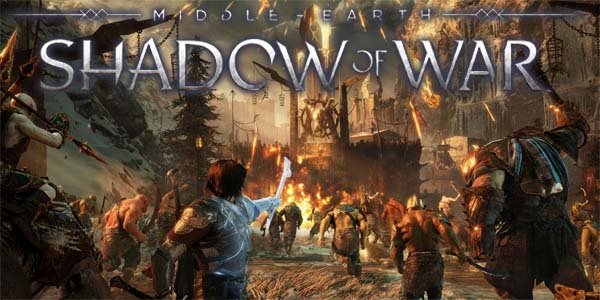
Dang. I was really hoping to have this out before the end of the year...
Shadow of Mordor was easily one of my favorite games of 2015, and one of my best reviewed games of that year, and I even cited it as an example of successful open world game mechanics. I've praised the game for its tightly-focused design, relatively limited scale, and the fact that it didn't waste the player's time with an excess of meaningless collectible hunts.
"The developers showed plenty of restraint in many areas of design so that they could focus on the innovative new feature that everything in the game revolves around. The design is tight and streamlined. They didn't waste the player's time with an excessively large, complicated map, or a multitude of irrelevant mini-games and side quests."
- from my Middle-Earth: Shadow of Mordor review
Yes, the original game did have some collectible hunts. It did have some filler content. It did have bullshit, game-y missions with arbitrary win/loss conditions. But those issues weren't pervasive enough to bring down the game as a whole, and the game generally flowed very smoothly. In their quest to mindlessly monetize the sequel, Shadow of War, Warner Brothers and Monolith have doubled down on both the best elements and the worst elements of Shadow of Mordor, and the result is beautiful when it works, and ugly when it doesn't.
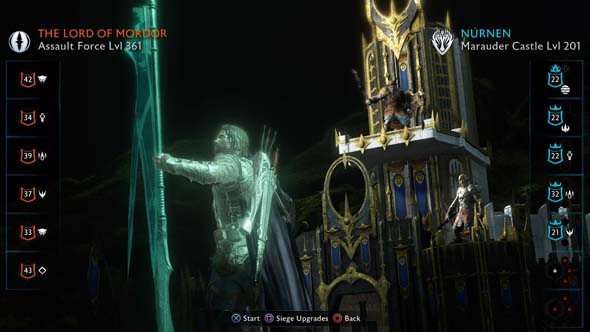
You now recruit orc captains to defend fortresses from Sauron's army.
The biggest problem is that the game now feels like a grind. In order to get you to pay for in-game, randomized micro-transactions called "War Chests", the campaign has been needlessly padded-out. Instead of having the option to hunt down uruk captains for the utilitarian purposes of gaining intel or gathering an army of mind-controlled slaves to do your bidding, you now must recruit orc captains into your own army in order to siege and then defend castles and fortresses from Sauron's counter-invasion. In principle, this sounds like a brilliant idea! I've often criticized open world and sandbox games for not having actual threats or consequences that pressure the player into acting. In fact, requiring that the player defend and hold captured strongholds from enemy counter-attacks is exactly the sort of thing that I've proposed as a compelling way to keep the game world feeling alive, and to keep the villain actually feeling threatening and antagonistic.
The problem is that (aside from one scripted castle defense) all the castle defending is back-loaded into the final act of the game. At this point, the plot is basically over, ... [More]
ae89c159-d700-491f-810c-2ed2093b5137|0|.0
Tags:Middle Earth: Shadow of War, Middle Earth: Shadow of Mordor, the Lord of the Rings, Monolith Productions, Warner Brothers Interactive Entertainment, J.R.R. Tolkien, Talion, Celebrimbor, orc, undead, wraith, elf, Middle Earth, Sauron, Shelob, Brûz The Chopper, action, open world, sandbox, parkour, RPG, micro-transaction, war chest, loot box, eBay
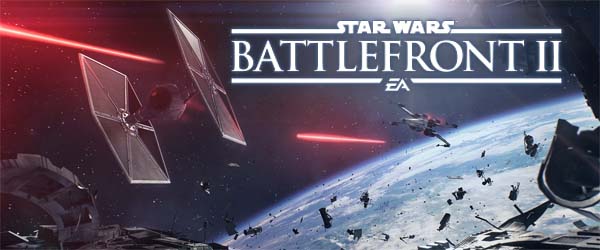
Dang, I was really hoping to get this one out before the end of the year...
Thanks to previews, journalists, and complaints from beta users, this is yet another game that I knew better than to buy on launch day at full retail price. Even before the game came out, beta players and gaming websites were already condemning Battlefront II for its pay-to-win multiplayer system. When the media finally got their hands on preview builds of the full game, they were quick to attack the online progression system. Once the game was released, public outcry forced EA to literally neuter the game's online economy.
Slot machines are legally required to disclose
their paytables -- and sometimes their RTP.
EA started damage control by slashing the prices of heroes so that they supposedly weren't as much of a grind to unlock. However, the sneaky bastards also reduced the rewards for various in-game activities (such as completing the campaign), so as to render the cost reduction virtually moot. Then, EA disabled micro-transactions altogether. So by the time I finally started playing the game (over a month after launch), it was a totally different experience than it was intended to be at launch.
Star Wars license-holder Disney was furious with EA for potentially tarnishing the Star Wars brand (especially with the pending release of The Last Jedi). EA's stock prices fell as a result.
Battlefront II has actually caused law-makers and regulatory agencies in the United States and Europe to consider whether loot boxes qualify as "gambling", and whether they should, therefore, be regulated as such, including banning their sale to minors. Corporations are also starting to hop onto the bandwagon of self-regulation. Apple announced that all iOS apps with randomized micro-transactions must disclose the odds associated with rewards. This is the same disclosure that is actually legally required for actual gambling, such as slot machines.
For the record, I do not object to gambling per se. I actually bet every week on college and NFL football. Don't worry, I live in Nevada; it's legal for me. I spent almost three years working as a game developer for a slot machine manufacturer, and the only reason that I'm not still at that job is because the entire department in which I worked got laid off in the wake of a corporate merger (I'm actually very bitter and opposed to corporate mergers, by the way, but that's a discussion for another time). So I don't have a problem with gambling. I just think that it has a time and a place, and I don't want that time or place to be in my video games that I'm already paying $60 just to play. This is why casinos don't generally charge a cover fee.
I personally feel that Shadow of War and Destiny 2 are much more egregious examples of corporate avarice.
Also, for the record, I think that Battlefront II's micro-transaction controversy is a bit overblown. It's an online multiplayer shooter in which there is no win condition or end state. Whether you want the extra hero characters, and whether you're willing to spend time or money to get them is entirely up to the player's own whim. The game is perfectly playable without those heroes, and you can play through the campaign completely without spending an extra penny. It's a bit sleazy that EA markets the game by advertising these characters, and then locks them behind a grind/pay wall, but fighting games have been hiding unlockable characters behind grind-walls for decades.
Battlefront II isn't even the worst micro-transaction / pay-to-win system to come from EA! EA Sports titles like Madden and FIFA have been getting away with much worse pay-to-win systems (via their respective Ultimate Team modes) for years. Personally, I also think that Shadow of War (review coming very soon) has a much more offensive micro-transaction model because Warner Bros actually tied it into that game's campaign. If you want to finish the story, you either have to sit through the grind, or pay to speed it up. Though all of these pale in comparison to Activision and Bungie locking formerly-accessible end-game content behind the pay-wall of a Destiny 2 expansion pack.
In any case, it's sad that a review of a video game has to turn into a political op-ed, but that's the sad state of things right now.
Controversy and public outrage forced EA to completely disable in-game purchases.
So, if I knew that the game was controversially terrible, why did I bother to play it? ... [More]
ca397aec-963c-441f-946e-73a4ac8e54dd|1|4.0
Tags:Star Wars, Star Wars: Battlefront, Star Wars: Battlefront II, loot box, micro-transaction, multiplayer, shooter, single player, campaign, Galactic Empire, Imperial Raider, Star Wars: X-Wing, Disney, EA, Electronic Arts, DICE, Motive Studios, Criterion Games, gambling, regulation, casino, eBay
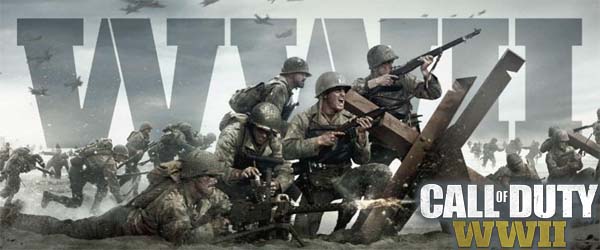
I haven't played a Call of Duty game since World At War on the PS3 almost 10 years ago. I really liked the first two CoD games on PC, but after Infinity Ward stopped developing the games, they increasingly focused on spectacle rather than any attempt to accurately portray war. After throwing back more enemy grenades in the first mission of World At War than were probably ever manufactured in all of World War II (I'm exaggerating a little bit), I got sick of that game and basically gave up on the franchise.
After having a little bit of fun with EA's Battlefield 1, I decided to pick up a used copy of Call of Duty World War II from eBay. I was curious if the return to World War II would be taken a little bit more seriously by Activision. It wasn't. This is the same old stale Call of Duty that I've been actively avoiding for the past decade. The single-player campaign didn't do anything to pull me in.
A light-gun shooting gallery
Probably the biggest problem with the campaign is just how rote and repetitive it feels. Almost all of the game's missions boil down to moving from one shooting gallery to another. When you aren't in an outright combat tunnel (like a bunker or trench), you're only given about a hundred feet of lateral space to work with. The whole game feels very confined and small in scale, with very few opportunities for any tactical movement such as flanking maneuvers. Just sit behind cover and pop out to take a few shots, then repeat. It might as well be an on-rails shooter, or one of those pop-out-and-shoot light-gun arcade machines like Time Crisis. I wonder if this was maybe done to make the game work better in VR? Maybe they wanted to reduce the amount of movement so that players don't get motion sick? But it's not VR, so it just comes off as lazy and tedious.
Almost all the missions boil down to moving from one narrow shooting gallery to another.
Even when the game tries to do something a little different, it usually still finds a way to make it uninteresting, or to outright get it wrong. There are some stealth mechanics shoe-horned into the game -- because of course there's stealth mechanics. They are rudimentary and very unforgiving. It's clear that certain segments are intended to be played stealthily, but you just don't have the tools necessary to make it work, and the levels aren't designed very well for stealth. Your limited field of view makes environmental and situational awareness very difficult. It's hard to tell where enemies are, and it's also hard to tell if your'e hidden behind cover. Even if you are effectively hidden, you can't peek out of cover to monitor the enemy's position or movements.
After stealth killing one or two enemies, I almost always got caught and was forced into more shoot-outs. Many of these scenarios involve the player being isolated and usually disarmed, so that you don't have the firepower to easily deal with a shootout when it inevitably happens. Put simply, the stealth is only barely functional and might as well not even have been included.
The undercover "Liberation" mission is the only level that is actually built around stealth.
The only stealth level that worked was the undercover "Liberation" mission with the Marquis (which you mostly play as a different character). ... [More]
66c29444-437c-4e77-8f5a-591d0762a918|0|.0
Tags:Call of Duty, Call of Duty: WWII, Activision, Sledgehammer Games, Raven Software, World War II, Germany, Nazi, history, war, Holocaust, Jew, concentration camp, online, multiplayer, Skinner Box, loot box, micro-transaction, gambling, shooter, bot, campaign, ESRB, eBay
|

| 12 | | | | | | | 60 | | 11 | | | | | | | 55 | | 10 | | | | | | | 50 | | 09 | | | | | | | 45 | | 08 | | | | | | | 40 | | 07 | | | | | | | 35 | | 06 | | | | | | | 30 | | 05 | | | | | | | 25 | | 04 | | | | | | | 20 | | 03 | | | | | | | 15 | | 02 | | | | | | | 10 | | 01 | | | | | | | 05 |
|